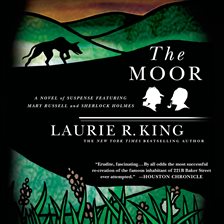 The Moor by Laurie R. King
The Moor by Laurie R. King
10 audio discs (11 hr.) (319 pages)
Reviewed by Rae C.
From SLPL Bibliocommons:
Young Mary Russell (A Monstrous Regiment of Women, St. Martin's, 1995) drops everything to join husband Sherlock Holmes in Devonshire, where the pair investigate an ancient family curse near the scene of The Hound of the Baskervilles published some 20 years earlier. The forbidding moor nearby provides them both danger and inspiration.
This is my favourite in the series so far- not only do we return to the scene of Holmes' most famous case, but Rev. Sabine Baring-Gould is not only a character, he is the reason Sherlock and Mary are there, and King writes Baring-Gould into the original Baskerville case. I'm sure much of this is because Baring-Gould's real life grandson is a known as Holmes authority and wove his grandfather's legacy into Holmes fictional biography. I also loved that the Moor itself was a character, or almost a character. Mary spends a good deal of time reading Baring-Gould's books about the Moor and its inhabitants. This book is rich in Dartmoor lore, legend, and folk. And it is a smashing good mystery! Have some thickly tannic Yorkshire Gold tea with cream and sugar while you read about Mary and Holmes out trudging around the Moor in rain and fog and mud for the perfect enjoyment of this book! Even if, like me, you are listening on audiobook and drinking tea out of your 21st century travel mug while you speed down an asphalt highway at 70 miles per hour! You won't notice the miles or the minutes going by. And I have to mention again how much I love the narrator! She is perfect, and will forever be Mary Russell to me!
PS- There is a comment on Bibliocommons about this book that says that Baring-Gould was Protestant and therefore would not refer to the Madonna as "mother of God". This is incorrect and misses the difference between the Anglican church and other Protestant churches. Baring-Gould most certainly did refer to Mary as "mother of God". The later Protestant reformation was about whether Priests or God had authority over sin. The early split between Rome and the Anglican church was about who would have authority over the King: God (meaning the King) or the Priests. The Anglican church has more in common with Rome than Luther.
No comments:
Post a Comment